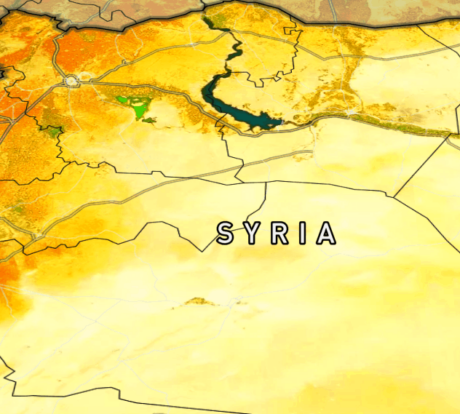Fayez Jasim Al-Faris holds a brown and white sheep while a veterinarian pulls apart the animal’s thick wool to reveal a small patch of skin. Quickly, the vet administers a potentially life-saving vaccine to the animal before releasing it to run back to the rest of the herd.
Living in a remote village in Deir Ezzor, a province in Northeast Syria, Fayez is making a living as a livestock farmer in one of the most difficult environments on earth. War, sequía, and poverty over the last decade have made it increasingly difficult for farmers to sustain operations.
When the Syrian Revolution erupted in 2011, Fayez lost half his flock as conflict drove feed and supply prices too high for him to continue farming. He was forced to sell over 50 animals to provide for his family. A few years later when ISIS moved into his village, he and his family fled, quickly eating through their savings. When they returned, they struggled to make ends meet.
But through a local organization called Sam for Development, Fayez received vaccines and veterinary care for his remaining flock, as well as training and agriculture inputs to begin growing his own alfalfa to provide for the animals. Since receiving Sam for Development’s support, his flock has expanded to include six new goats and five more sheep.
“After this project, especially due to the technical consultations, my skills and experience improved,” says Fayez. “I now can identify and combat diseases.”
Sam for Development is a grantee of the Agriculture and Livelihoods Stabilization Partnerships (ALSP) programa, which implements agriculture and livelihoods projects primarily through Syrian civil society organizations in the Northeast. Through bringing capacity building and funding to these local groups, ALSP has directly impacted over 20,000 people living in difficult situations.
Food security is a major area of emphasis for ALSP. According to a report from the FAO, in the first three years of the conflict, sheep numbers declined by 45 por ciento, goats by 30 por ciento, cattle by 40 percent and poultry by 55 por ciento.
“When we help the farmers and support them to continue, we stabilize not only the farmers’ business but the food security of the region,” says Mesud Ahmed, Senior Program Manager for ALSP.
Chicken Run: Saving the poultry industry
ALSP’s work with vaccinations became suddenly more urgent at the end of 2019 when a deadly disease began quickly spreading through the region’s poultry farms. Called the Newcastle virus, the disease is deadly for birds and threatened the livelihoods of poultry business owners in an already fragile region.
Overwhelmed and with no funding from the Self-Administration of North East Syria’s (NO) Ministry of Agriculture, the NGO Humanitarian Coordination in Raqqa reach out to ALSP and other INGOs working in the country for aid. Because poultry is a primary source of protein for the region, the need was dire.
The ALSP team then coordinated sending vaccination mobile clinics to the thousands of major poultry farms, working with other organizations in the region to deliver.
“We targeted commercial poultry farms that if we didn’t support them, then it was going to have a major effect on the food security of that community,” Hind Audsley, Chief of Party says.
For Newcastle and other common diseases that affect livestock, the project has administered more than 450,000 dosages of vaccines to livestock owners across Deir Ezzor and Raqqa, successfully preventing a total collapse of the poultry industry in the Northeast.
After this initial slew of vaccines, ALSP recognized how critical assisting these businesses was for the region, so they continued to support the poultry industry, providing fodder, equipment and support in necessary renovations.
“We decided to continue it because it was really about securing the livelihoods of these farmers,” says Audsley. “But also, it really ensured the [region’s] seguridad alimentaria, the protein, that needed to be delivered at affordable prices for the Northeast.”
Building trust after years of war
Aside from supporting farmers through providing vaccines, ALSP has worked in a range of other agricultural activities, including beekeeping, potato farming, tunnel gardening and irrigation. But supporting families with technical assistance is only half the battle, reaching villages where they live is another.
“We specifically targeted villages that are hard to reach and that other organizations have not yet gone to or don’t want to,” says Audsley. “In Deir Ezzor most of them are returnees, so those villages haven’t yet been engaged.”
Many of these remote villages are still living under fear of threat from ISIS and other militant groups, distrusting any outside aid or presence. Ahmed says that bringing aid in the form of vaccines, por ejemplo, builds community trust and serves to lay the groundwork for future interventions.
“Because in some regions we cannot go and start with capacity building and peace building," él dice. “They are recently liberated from ISIS, they are afraid… So, you have to provide something material.”
Tribal differences and long-standing cultural barriers add another layer of complexity. The region is ethnically diverse and ALSP relies on its Syrian staff’s understanding of how to navigate these differences.
“We try to understand the tribe’s mentality,” says Ahmed. “We try to understand the security atmosphere and build rapport there.”
‘We belong to each other’
The root of ALSP’s work is a belief that development in a post-conflict zone works best when programs respond to the most immediate needs that the people themselves identify, with an eye to sustainability.
Across Northeast Syria’s rural communities, stabilizing the agriculture industry through vaccines and tunnel gardens, advocacy for fair market prices and technical support, are giving farmers ground to stand on, grow in. In all cases, working within the context is the heart of Creative’s approach in Syria.
Ahmed, a Syrian from the Northeast himself, says it best:
“We have the context in order to help the people,” says Mesud Ahmed. “You all belong to them and they belong to you.”
